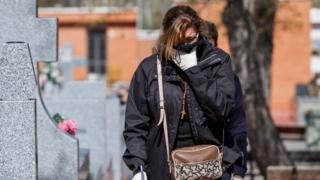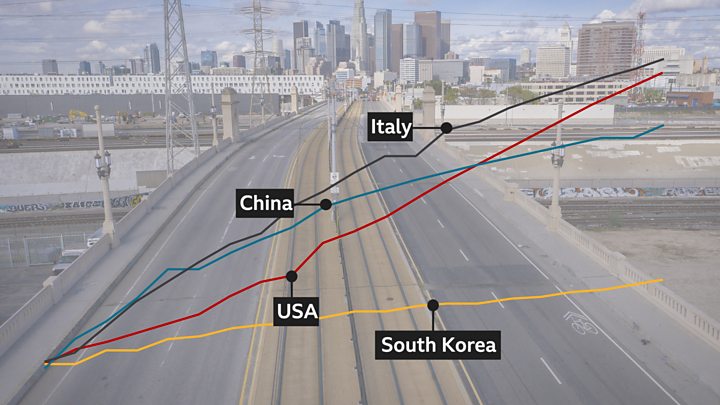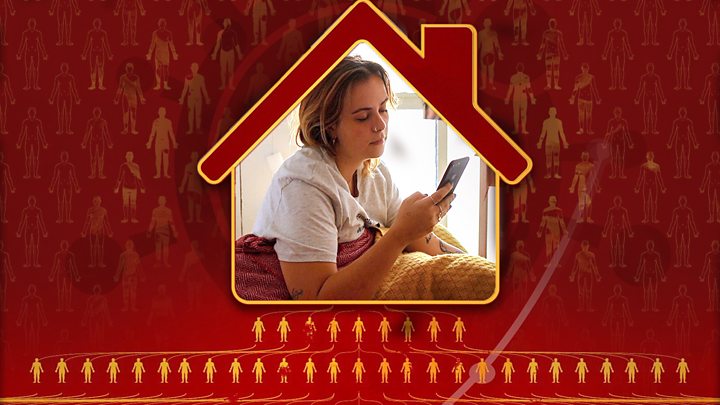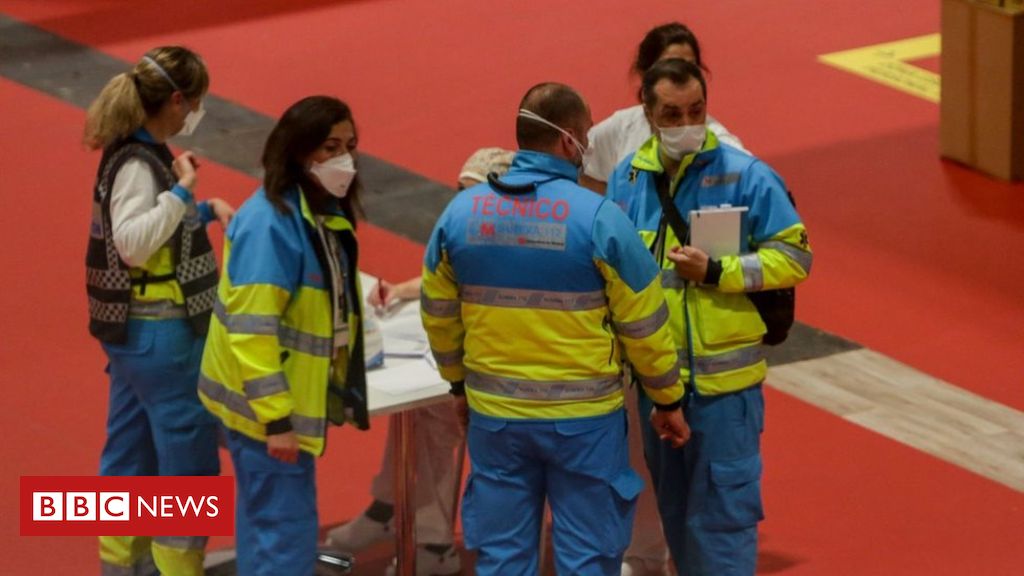 Image copyright
Image copyright
AFP
Spain has the second-highest number of deaths related to coronavirus
Spain has recorded another 864 deaths related to coronavirus, the highest in one day, as the total number of deaths across Europe has gone beyond 30,000.
More than 9,000 people have died in Spain, which is second only to Italy in fatalities caused by the virus.
Confirmed cases in the country have passed 100,000, but numbers show the infection rate continues to fall.
UN Secretary General António Guterres said the pandemic was the world’s biggest challenge since World War Two.
The warning comes amid dire predictions about the possible economic impact of measures imposed to fight the virus. A UN report estimates that up to 25 million jobs could be lost around the world as the result of the outbreak.
The number of confirmed cases globally is now over 870,000, with more than 43,000 deaths, according to data compiled by Johns Hopkins University in the US.
Wednesday’s number of deaths in Spain was marginally higher than the 849 announced the day before, and the country has now seen more than 800 deaths for five days in a row. But health officials believe the latest 12% increase in daily infections is further evidence that the rate has stabilised.
Spain has been in lockdown for over two weeks, with further restrictions on movement introduced two days ago. But health services in the hardest-hit areas, including Madrid and Catalonia, are still struggling, with shortages of medical equipment a particular problem.
Image copyright
EPA
In France two high-speed trains have been equipped to move patients infected with Covid-19 out of the Paris region
Italy remains the worst-affected country, with a total of 105,792 cases and 12,428 deaths reported up to Tuesday evening, while Spain has 102,136 cases and 9,053 deaths. However, Italy has seen the daily rise in infection rates fall to 2.8%, well down on a few days ago.
The number of fatalities in the US has now topped 4,000, and Iran says Covid-19 – the disease caused by coronavirus – has claimed 3,000 lives. Belgium said more than half its intensive care beds were occupied as it reported a rise of 123 deaths, bringing the country’s death toll to 828.
Meanwhile the Nato military alliance said it remained in “a state of operational readiness” to defend the borders of its members despite the pandemic, although it had cancelled a number of exercises to prevent the spread of infection.
What did Mr Guterres say?
Speaking at the UN headquarters in New York Mr Guterres said: “The new coronavirus disease is attacking societies at their core, claiming lives and people’s livelihoods”.
He said it could bring a recession “that probably has no parallel in the recent past”.
“Covid-19 is the greatest test that we have faced together since the formation of the United Nations,” he said, calling for “an immediate co-ordinated health response to suppress transmission and end the pandemic”.

Media playback is unsupported on your device
Mr Guterres urged industrialised nations to help those less developed, or potentially “face the nightmare of the disease spreading like wildfire”.
African finance ministers have appealed for $100bn (£80bn) in emergency financing, with debt relief from the International Monetary Fund, World Bank and European Union.
Manufacturing output in the UK in March hit its lowest point since 2012, and unemployment in Austria has soared 52.5% on March last year to its highest level since 1946. The crisis has not yet filtered through to Italian job levels with unemployment in February slightly down at 9.7%.

Media playback is unsupported on your device
What are the latest developments around the world?
In the US, 865 people have died in the past 24 hours and in all more than 189,000 have been infected, Johns Hopkins reports.
President Donald Trump warned of “a very, very painful two weeks”, as modelling by the White House’s coronavirus task force estimated that between 100,000 and 240,000 people could die in the coming months.
In other developments:
- The UK on Wednesday recorded its worst daily death toll so far: 563 – 2,352 people have died in total
- The Netherlands has recorded a further 134 deaths, bringing the total to 1,173, but the rate of hospital admissions has fallen
- Saudi Arabia has asked Muslims to delay booking their Hajj pilgrimage to Mecca and Medina in July and August
- France on Tuesday recorded 499 new hospital deaths in the last 24 hours, bringing the total to 3,523. This is the highest daily rise in such deaths in France
- Switzerland said late on Tuesday it had seen 433 fatalities – and a further 12 were announced in the worst-hit area of Ticino on Wednesday
- In Russia, officials have recorded another seven deaths and a total of 24, with infections reaching 2,777
- In Sweden, a number of ski resorts are to close before the Easter holidays as officials tighten the relatively loose restrictions imposed so far
- China says it has taken steps to ensure the quality of its exports of medical supplies, after several European countries complained of defective Chinese-made test kits and masks
- In India, the authorities are searching for hundreds of people who attended a religious event in the capital that has set off several Covid-19 clusters
What lessons should world learn from outbreak?
The coronavirus pandemic is stress-testing all institutions – national and global – and many are struggling to perform effectively in almost unprecedented circumstances.
There is an unseemly competition for scarce medical equipment. But experts at the Rusi think-tank in London are already looking to the future.
They argue the world needs a whole new kind of institution to deal with so-called “black sky hazards” – natural or man-made disasters that are of such a scale that they disrupt the whole global system of interdependent supply chains on which human life depends.
The authors, Karin von Hippel and Randolph Kent, say there is no current organisation to coordinate the sharing of information and policy options in the way that the World Health Organization covers public health.
They suggest a new body established by the UN, but not part of it, to provide a forum for promoting discourse and solutions for ever more entangled problems of global consequence. The aim, clearly, is to be better prepared next time.
How have you been affected by the issues relating to coronavirus? Share your experiences by emailing haveyoursay@bbc.co.uk.
Please include a contact number if you are willing to speak to a BBC journalist. You can also contact us in the following ways:




